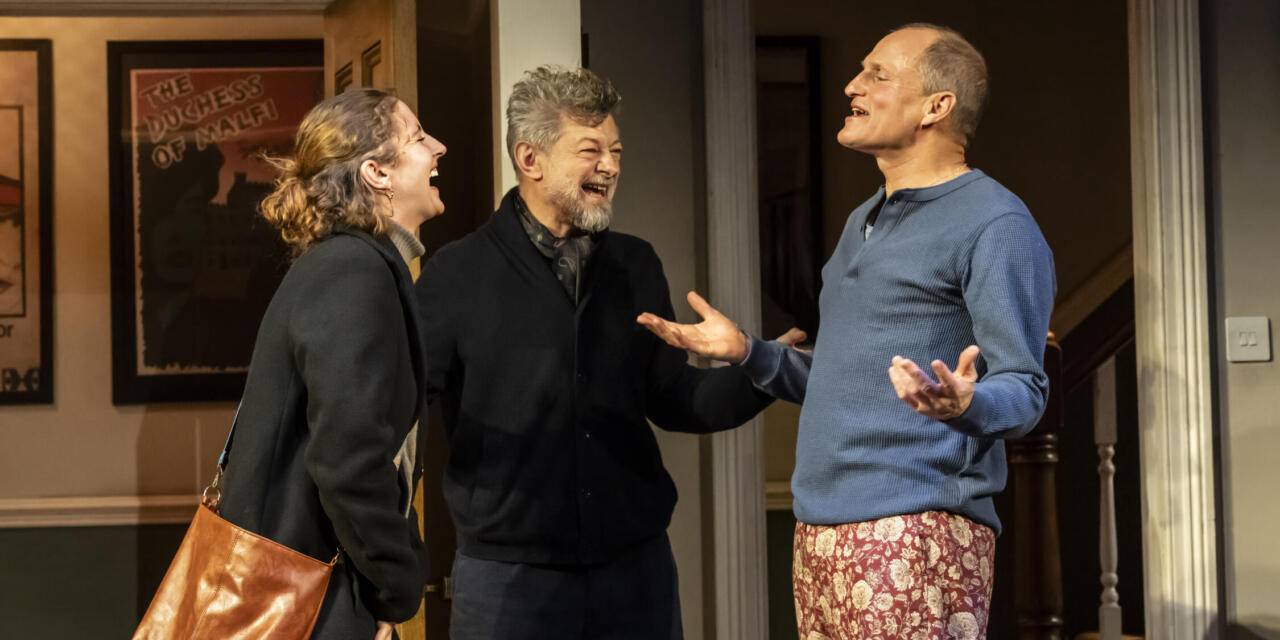An American actor, an English director, and a Northern Irish playwright walk into a house in London to start working on a new production. This is not so much the opener of a joke as the tantalizing premise of David Ireland’s play Ulster American. First seen in 2018, this outrageous comedy now receives its belated London premiere in a sleek production directed by Jeremy Herrin and starring the turbo-charged cast of Woody Harrelson, Andy Serkis, and Louisa Harland.
A three-hander of unexpected extremities, Ulster American centers on what is gradually revealed to be the hyper-toxic and self-interested web of working relations between its characters. On the day before rehearsals are set to start, Oscar-winning actor Jay (Harrelson) visits his director Leigh (Serkis) to discuss their imminent work, and to meet the young playwright Ruth (Harland), whose authentic “Irish play” seems to appeal to both the actor and the director for all the wrong reasons. But when star-struck Ruth’s diplomatic niceties are abused by both men’s not-so-veiled misogyny and aggression, what starts out as amicable teasing erupts into blood-and-guts violence. The result is a tightly controlled battlefield of competing interests and creative demands, culminating in an acidic, tragicomic portrayal of what it might mean to navigate today’s creative economy as a young female artist.
Ireland’s piece deploys a range of self-consciously provocative—indeed, offensive—exchanges to needle its audience in ways that alternate between the crass and the ingenious. Dramatically, all this rhetorical edginess appears more warranted during the play’s second half, when it directly motors and modifies the central conflicts. The play’s surreptitious hilarity, and the force of its occasionally ridiculous comedy, lies in the transformation of throwaway remarks into an emphatic arsenal of weapons and defenses.
At the heart of this trajectory reside questions about the fraught relations between personal identity and artistic output, between decorous appearances and vile interiorities. Even as Ireland knowingly exaggerates his story to the point of the absurd, its underlying mechanisms—the revolting collusion of older men against their young female collaborator, the insistent resort to virtue signaling, the denial of others’ truth—retain their chilling veracity.
Herrin’s well-paced staging is served handsomely by his accomplished cast: Harrelson’s Jay keeps striking the wrong chord in all the ways he should, and the self-indulgent eccentricities of his character are finely controlled—and unleashed—in performance. Serkis is brilliant as the spineless director, expressing Leigh’s ever-shifting allegiances and self-serving decision-making with gentle confidence. And Harland is excellent as the writer Ruth, whose tumultuous journey from start to finish comes across with dazzling force. In the hands of this superb trio, Ireland’s delicate—because dramatically risky—play reaches its boiling in the best of possible conditions.
This theatrical pressure-cooker is aptly visualized by Max Jones’ naturalistic set of a contemporary interior, whose lighting by Oliver Fenwick changes sleekly as the sun sets outside. Renny Krupinski’s fight direction is worthy of special mention, too, with the play’s final moments delivering one punch after another in their intensity. Here, turning into a brutal weapon, Jay’s Oscar statuette makes concrete Ulster American’s acerbic points about the intermingling of fame and violence, of artistry and sacrifice. It’s a sucker punch of a conclusion to a jaw-dropping drama of nervous laughter, awkward silences, and entertaining explosions.
This post was written by the author in their personal capacity.The opinions expressed in this article are the author’s own and do not reflect the view of The Theatre Times, their staff or collaborators.
This post was written by Mert Dilek.
The views expressed here belong to the author and do not necessarily reflect our views and opinions.


















